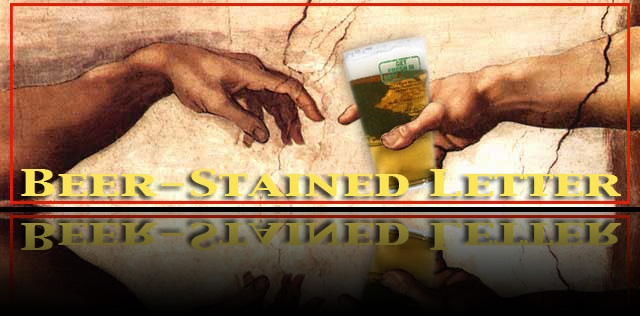 Simple observation: All you really need to know about Beer Wars is that it’s an articulation of why you should support your local craft brewery – brewpub or bottler. Because they offer selection and styles relevant to the times. And because the mega brewers would love to crush them all, in the manner of The Godfather (“It’s just business...”) and by any means necessary.
Simple observation: All you really need to know about Beer Wars is that it’s an articulation of why you should support your local craft brewery – brewpub or bottler. Because they offer selection and styles relevant to the times. And because the mega brewers would love to crush them all, in the manner of The Godfather (“It’s just business...”) and by any means necessary.
But if you need more …
Synopsis
Beer Wars speeds through the rise of the big brewers after Prohibition and the demise of  America’s brewing heritage, and how Bud, Coors and Miller warred with each other even before they met the likes of Samuel Adams and Sam Calagione.
America’s brewing heritage, and how Bud, Coors and Miller warred with each other even before they met the likes of Samuel Adams and Sam Calagione.
Along parallel tracks, the film highlights Sam C’s success with his Dogfish Head brewery and the struggles of Rhonda Kallman, who spun herself off from the Sam Adams brand she helped build with Boston Beer founder Jim Koch to pursue her vision of Moonshot Beer, a caffeine-jacked brew she developed (and apparently has contract-brewed) as her own brand.
Sam C grows and lands on the behemoth brewers’ anti-competition radar; Rhonda wearily struggles for financing to keep her enterprise afloat, as she chases shelf space and tap handles, trapped in a frustrating cash-strapped cycle that makes attracting investors next to impossible.
From location to location, you follow the protagonists, and you're shown who the friends of the big brewers are (count Congress among them); you witness the National Beer Wholesalers Association preach the Gospel of Middleman and how we must believe that, 76 years on, the layer between brewer and consumer is still a swinging deal for everyone because it earned its stripes in the crucible of Prohibition’s crash. (We’d argue that the middle layer is vestigial.)
While Sam grows in both size and popularity, Rhonda continues to falter. And the mega brewers get more defensive over their market position. And so it goes.
Review
Beer Wars isn’t a seamlessly done film. (Read an unkind, but accurate enough, review here.) It has some dodgy production values (soft-focus images that lost crispness because they were scaled up when they shouldn't have been) and uneven pacing that made you think the film was winding up, only to discover a particular summation was really a transition to another section.
 Plus, it pretty much preaches to the choir, i.e. you probably went to see it because you’re into craft beer and didn’t think too much of the mega brewers’ dominance to begin with. (So is the film just a call to arms, a rally for the base?)
Plus, it pretty much preaches to the choir, i.e. you probably went to see it because you’re into craft beer and didn’t think too much of the mega brewers’ dominance to begin with. (So is the film just a call to arms, a rally for the base?)
But all of that aside, Beer Wars does put under one tent the key elements of the longtime rant about bland beer made by overgrown giants who hold most of the cards. Writer/director Anat Baron deserves credit for committing that to something craft beer folks can point to, and she manages to tie human emotions to it all, even though her first-person documentary style at times comes across as too genial and fluffy. This is, after all, war.
Still, the film will recharge your disdain for the giant brewers who dumb-down beer (triple-hopped Miller Lite anyone?), and the wholesaler system that was forced down everyone’s throats to make the legality of alcohol under the 21st Amendment palatable after a bitter temperance movement that was rife with bootlegging and bootless government policy.
Underdeveloped
One point that the film didn’t even begin to pound nearly enough was the revelation that AB has sued Dogfish Head over the use of the words punkin and chicory in its names for a fall seasonal and a stout. There was no exploration of this, just a passing mention. Sadly, that's a blown opportunity to show how Goliath can throw sand in David’s eyes and make him cry uncle by forcing him to lawyer-up and waste precious capital defending a frivolous legal challenge.
Yet in the long run, we’re not griping about Beer Wars. It may keep the discussion going, even if it is just among the party faithful. Plus, we’re in New Jersey, where there’s a giant brewery in Newark and, in general, an unfriendly climate for craft brewers, à la arcane and arbitrary regulations.
NOTE: The photos are from the live-feed panel discussion moderated by Ben Stein that followed the film.
 What we really mean to say is, take a trip to Shad Fest, but go for the beer.
What we really mean to say is, take a trip to Shad Fest, but go for the beer. There's a lot of local support for the brewery, and RH can draw a crowd with its brews. But they’ve scored some extra space this year, so you’ll have plenty of elbow room to enjoy the beer and food. We confess, the shad chowder really isn’t something to write home about, but there’s plenty of selection in the cuisine concession.
There's a lot of local support for the brewery, and RH can draw a crowd with its brews. But they’ve scored some extra space this year, so you’ll have plenty of elbow room to enjoy the beer and food. We confess, the shad chowder really isn’t something to write home about, but there’s plenty of selection in the cuisine concession.

















